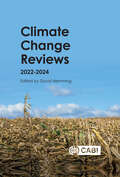- Table View
- List View
Climate Change Impact on Soil Erosion in Sub-tropical Environment: Application of Empirical and Semi-empirical Models (Geography of the Physical Environment)
by Subodh Chandra Pal Rabin ChakraborttyThis work focuses on the potential impact of climate change on soil erosion in a monsoon-dominated sub-tropical region. Water-induced soil erosion due to extreme rainfall during the monsoon period is a major problem worldwide, from different environmental and socio-economic perspectives. This study region covered (South Bengal) is one of the fertile agricultural belts that produces a good amount of produce and contributes to the country's GDP. However, the rate of agricultural output has decreased rapidly in recent times due to a decline in soil fertility. The monsoon-dominated sub-tropical region has unique characteristics in terms of seasonal temperature fluctuations and the availability of rainfall events. The sub-tropical region is densely populated, with the majority of the population relying on rain-fed agricultural production systems. The declining rate of agricultural production has also established that soil fertility is declining and soil erosion is increasing. Numerous studies show that soil erosion is the major cause of the region's rapidly increasing trend of land degradation. A homeostatic mechanism cannot replace soil erosion, and a gap arises between soil erosion and regolith formation. Extreme changes in land use and land cover, population growth and the lacking support for traditional agricultural practices and management practices can accelerate the rate of soil erosion and its associated reservoir sedimentation in most countries of the tropical and sub-tropical environment. Quantitative information with maximum possible accuracy through validation regarding soil loss can be an essential part of the appropriate and sustainable soil and water conservation planning. The precise aspects of modern day management strategies are soil erosion susceptibility mapping using empirical and semi-empirical models in a GIS platform or the use of probability statistics. The main objective of this work is to propose the most suitable development strategies considering the amount of soil erosion for the present and future periods. Extensive field research has been done to identify the support practice factor that the local stakeholders adopt in this region.
Climate Change Impact on Water Resources: Select Proceedings of HYDRO 2023 (Lecture Notes in Civil Engineering #561)
by Manish Pandey Jaan H. Pu N. V. Umamahesh Jew DasThis book comprises the proceedings of the 28th International Conference on Hydraulics, Water Resources, River and Coastal Engineering (HYDRO 2023) focusing on broad spectrum of emerging opportunities and challenges on the impact of climate change on water resources. It covers a range of topics, including, but not limited to, climate change assessment and downscaling issues, climate change impact and adaptive measures, influence of climate variability on hydro-climatic variables, impact of climate change on water resources of Indian Rivers, etc. Presenting recent advances in the form of illustrations, tables, and text, the content offers readers insights for their own research. In addition, the book addresses fundamental concepts and studies on the impact of climate change on water resources, making it a valuable resource for both beginners and researchers wanting to further their understanding of hydraulics, water resources and coastal engineering.
Climate Change Impacts and Adaptation Strategies in Japan: Integrated Research toward Climate Resilient Society
by Nobuo Mimura Satoshi TakewakaThis open access book presents the latest Japanese research for the projection of climate change impacts and the evaluation of adaptation policies, with a particular focus on the S-18 Project—a nationwide, interdisciplinary research initiative involving experts from various fields. Readers can get a comprehensive view of the latest knowledge and strategies to combat climate change impacts in Japan. The topics span the research framework and future scenarios for climatic and socio-economic changes, and impacts and adaptation measures in major sectors at both national and local levels. Target sectors include agriculture, forestry and fisheries, natural ecosystems, natural disasters and coastal zones, water resources, urban infrastructure, and transportation, quality of life and human health, and economic analysis of the impacts. The book features high-resolution spatial distribution of impacts, changes in vulnerability with localities, effects of mitigation and adaptation measures, and implications of climate change policies on society. As the world experiences increased extreme weather events, this comprehensive book is a timely reference for similar studies in other countries through the presentation of research results and lessons obtained in Japan. Researchers, policymakers, and academics in environmental science, climate policy, and related fields will find this book invaluable for understanding and addressing the multifaceted challenges of climate change adaptation and mitigation. Some chapters were written originally in Japanese. The English translation was facilitated by artificial intelligence. The authors later revised the content for accuracy.
Climate Change Impacts and Sustainability: Ecosystems of Tanzania (CABI Climate Change Series)
by Eugen Cyrilo Namkunda Johnson Richard J Katondo Godwin A Lema Emma T Liwenga N A Mbwambo Anselm R Mwajombe Patrick M Ndaki Agnes Ms Nyomora Noah M Pauline Florian Silangwa Kelvine C Shirima Pontian L Temba Adera Sisay Wassie Lucas E Yamat Josephine M ZimbaThis book provides a detailed analysis of the economic and environmental impacts of climate change on the tropical ecosystems in Tanzania. Topics covered include agriculture, marine resources, wildlife, and weather forecasting. The analyses concentrate on real and potential impacts of climate change, focusing on changes in temperature and precipitation. Adaptive capacity and strategies for enhancing resilience (such as changing crop types and crop patterns in farming) are described. Particular attention is paid to climate change impacts on vulnerability and resilience in communities and ecosystems with special reference to extreme events such as droughts and flooding. The book: is among the first books to analyse in detail climate change effects in Tanzania, highlighting the unique vulnerability of communities and ecosystems in East Africa from a socio-ecological point of view. discusses potential future threats as well as providing solutions to current problems. examines the application of local knowledge systems when formulating solutions. The book is essential reading for researchers on climate change and socio-economic impacts in tropical rural economies and of broad interest to climate change scientists, tropical ecologists, conservationists and agricultural scientists.
Climate Change Impacts in India (Earth and Environmental Sciences Library)
by Abdelazim Negm Chaitanya B. Pande Kanak N. MoharirThis book focuses on the impact of climate change on India, addressing environmental problems and conducting an analysis of the climate change impact on mitigation processes. It examines crucial factors such as soil capability, soil erosion, soil salinity, and watershed planning, as well as the influence of climate change on water resources, including groundwater. The book explores the interconnections between climate change, soil erosion, natural resources, and agricultural practices, emphasizing their direct or indirect effects on water, vegetation, irrigation planning, and the environment.Furthermore, it delves into various aspects of soil erosion, soil compaction, soil nutrients, aquifers, and the impact of climate change on vegetation, crops, pests, moisture, and sustainable yield. These factors contribute to the development of climate change-related factors within the agricultural sector, ultimately fostering sustainable development and management practices for the future. The book also highlights the significance of parameters such as land use change analysis, rainfall, water resources, crop yield, sustainable agricultural development, pest management, and disease control in accurately assessing the impact of climate change. The insights gained from these analyses can inform future development and planning strategies. Therefore, this book serves as a valuable resource for researchers, scientists, NGOs, and academics interested in understanding the impact of climate change on natural resources and ecological systems.
Climate Change Impacts on Agriculture and Food Security in Egypt: Land and Water Resources—Smart Farming—Livestock, Fishery, and Aquaculture (Springer Water)
by Abdelazim M. Negm El-Sayed Ewis OmranThis book gathers contributions discussing climate change in Egypt from an agricultural perspective. Written by leading experts, it presents state-of-the-art insights and the latest research developments in light of the most recent IPCC report. Focusing on identifying the specific phenomena that affect climate change in Egypt, the book also addresses the effects of climate change in Egypt, particularly examining the quality and quantity of water resources as well as the socio-economic impacts of climate change on agricultural activities. Furthermore, it explores alternative solutions to support agriculture and food security and raises awareness of adaptation and protection as the key to adapting to the risks posed by climate change. Covering the four fundamental pillars of climate change: food security, availability, access and stability, this book is a valuable resource for stakeholders involved in achieving the 2030 sustainable development goals in Egypt and all countries with similar climatic conditions. It is also a unique source of information and updates on climate change impacts for graduates, researchers, policy planners, and decision-makers.
Climate Change Impacts on Agriculture: Concepts, Issues and Policies for Developing Countries
by Muhammad Zaffar Hashmi Khalid Mahmood Shah Fahad Wajid Nasim Jatoi Muhammad Mubeen Shaukat AliThis book offers perspective on climate change impacts on developing nations from scholars within those nations, primarily focusing on agriculture. Throughout three parts containing a total of over twenty chapters from scholars in developing countries, it aims to offer guidelines for researchers, policymakers, and farmers themselves on how developing countries can achieve sustainable food security and continue development on a sustainable basis.Part I covers climate change concepts and issues for developing countries; Part II offers chapters dealing with social issues surrounding climate change and agriculture; Part III addresses practical policies that can be implemented to work toward achieving the goals described above. Agriculture is a key sector in developing countries in terms of economic growth and social well-being. Adapting and building resilience to climate change means increasing agricultural productivity and incomes and reducing greenhouse gases emissions. This volume represents an effort toward collecting knowledge on the technical, policy and investment measures to achieve sustainable agricultural growth in the sectors of grain, fruit, vegetable, fiber, feed, livestock, fisheries and forest under climate change in one place.
Climate Change Impacts on Basin Agro-ecosystems (The Anthropocene: Politik—Economics—Society—Science #18)
by Selim Kapur Erhan Akça Tsugihiro Watanabe Mehmet Aydın Rıza KanberThis book is based on the outcomes of a Turkish-Japanese bilateral project dealing with the impacts of climate change on basin agro-ecosystems. The book is unique in showing an up-to-date knowledge for the developing world. The chapters are related to: a) the development and improvement of a regional climate model for a more accurate prediction with higher resolution of future changes in regional climate, b) the structure of land and water management in agricultural production systems in arid areas, especially to quantitatively evaluate the relationships among cropping systems, hydrological cycle and water balance in farmland and its environments, c) the assessment of the impact of climate change and its adaptation on agricultural production systems, mainly on the aspect of land and water management, and d) the vulnerability of agricultural production systems from natural changes and the measures for enhancing sustainability of agriculture.This book elaborates on the methodologies for the assessment of climate change impacts on agricultural production and adaptationIn this book, the concepts and processes of an integrated approach are outlined, and its application in a case project is introducedThe approaches described in the chapters would be applicable in different situations and could be improved with experience and the introduction of advanced techniques
Climate Change Impacts on Coastal Soil and Water Management
by Zied Haj-Amor Salem BouriClimate Change Impacts on Coastal Soil and Water Management discusses the latest approaches for monitoring soil and water degradation in coastal regions under current climate conditions as well as potential further changes in the future. It presents an overview of climate change impacts on soil and water resources and summarizes the adaptation of practical options and strategies to minimize the potential risks, such as land degradation, seawater intrusion, droughts, ocean acidification, etc. The book aims to promote the adoption of best practices, which can be selected and implemented according to the respective local conditions. In addition, the recommendations for specific soil and water use planning strategies to address climate change can also be incorporated into national and international development plans. Features: • Presents the general properties and analysis of soil and water resource conditions for coastal regions • Offers practical advice for adapting to climate change through case studies from diverse coastal settings around the globe • Presents information in an accessible format for practitioners in soil and water sciences, as well as for those working in related disciplines • Includes end-of-chapter summaries and homework problems Written primarily for practicing soil, water, agricultural, and environmental scientists, this book provides the latest research on soil and water resources management, soil processes and properties, and the related effects of climate change. It assesses the effectiveness of the methods currently in use and under future climate change scenarios as well.
Climate Change Impacts on Fisheries and Aquaculture: A Global Analysis
by Bruce F. Phillips M¿nica P¿rez-Ram¿rezThe first comprehensive review of the current and future effects of climate change on the world’s fisheries and aquaculture operations The first book of its kind, Climate Change Impacts on Fisheries and Aquaculture explores the impacts of climate change on global fisheries resources and on marine aquaculture. It also offers expert suggestions on possible adaptations to reduce those impacts. The world's climate is changing more rapidly than scientists had envisioned just a few years ago, and the potential impact of climate change on world food production is quite alarming. Nowhere is the sense of alarm more keenly felt than among those who study the warming of the world's oceans. Evidence of the dire effects of climate change on fisheries and fish farming has now mounted to such an extent that the need for a book such as this has become urgent. A landmark publication devoted exclusively to how climate change is affecting and is likely to affect commercially vital fisheries and aquaculture operations globally, Climate Change Impacts on Fisheries and Aquaculture provides scientists and fishery managers with a summary of and reference point for information on the subject which has been gathered thus far. Covers an array of critical topics and assesses reviews of climate change impacts on fisheries and aquaculture from many countries, including Japan, Mexico, South Africa, Australia, Chile, US, UK, New Zealand, Pacific Islands, India and others Features chapters on the effects of climate change on pelagic species, cod, lobsters, plankton, macroalgae, seagrasses and coral reefs Reviews the spread of diseases, economic and social impacts, marine aquaculture and adaptation in aquaculture under climate change Includes special reports on the Antarctic Ocean, the Caribbean Sea, the Arctic Ocean and the Mediterranean Sea Extensive references throughout the book make this volume both a comprehensive text for general study and a reference/guide to further research for fisheries scientists, fisheries managers, aquaculture personnel, climate change specialists, aquatic invertebrate and vertebrate biologists, physiologists, marine biologists, economists, environmentalist biologists and planners.
Climate Change Impacts on Gender Relations in Bangladesh: Socio-environmental Struggle of the Shora Forest Community in the Sundarbans Mangrove Forest (SpringerBriefs in Environment, Security, Development and Peace #29)
by Sajal RoyThis book explores gendered perceptions of the Sundarbans Forest in Bangladesh, and the extent to which these perceptions are affected by extreme weather events (specifically, cyclones Aila and Sidr). Based on ethnographic fieldwork in Shora, a rural village in southern Satkhira, Bangladesh, the book explores gendered activities in the forest, especially women’s interaction with the forest resources. The findings present a clear picture of the Shora community’s local knowledge about the Sundarbans Forest, as well as the ecological and economic contributions for the forest people. The book makes a timely contribution to the wider study of gender, post-cyclone recovery, ecology and resilience.
Climate Change Impacts on Soil-Plant-Atmosphere Continuum (Advances in Global Change Research #78)
by Himanshu Pathak Dibyendu Chatterjee Saurav Saha Bappa DasThis book explores the interaction between climate change phenomena and the soil–plant–atmosphere continuum (SPAC), which inspects the crucial role of anthropogenic greenhouse gas emissions in modifying the net ecosystem response towards the modified environment. Increasing concentration of anthropogenic greenhouse gases (carbon dioxide, methane and nitrous oxide) from massive deforestation, fossil fuel burning and rapid industrialization in the post-nineteenth century have led to adverse changes in our global climate system. The book evaluates the net impact of climate change on soil, plants and the atmosphere individually and in totality. Among the topics it covers are the impact of climate change on soil environment which encompasses soil processes, nutrient cycling, soil carbon sequestration, soil biota response and soil health management. Also included are the impact on plants with respect to the dry matter assimilation pattern, modification in resource use efficiency, rhizosphere interactions, management of biotic and abiotic stress factors, and regulatory mechanisms of biotic stress factors in modifying the net agroecosystem response towards climate change. Moreover, potential genetic engineering options for establishing C4 or Crassulacean acid metabolism (CAM) in C3 plants, heat–drought stress on pollen biology, breeding ideotype, ecological indicators and crop simulation modelling are considered. Lastly, the impact on the atmosphere takes into account greenhouse gas measurements, mitigation options, eddy covariance measurement of greenhouse gasses, satellite-based monitoring, ecosystem services, abiotic stress management options, air pollution and atmospheric modelling. This book is a valuable resource for researchers, students and policymakers in understanding climate change impacts on interaction processes among the atmosphere, soil and plants from the local to regional scales.
Climate Change Mitigation and Adaptation to Improve Food Security in South Asia
by Mannava Sivakumar Rafiq Islam Heulin Thierry Ahm Mustafizur RahmanBoth food security and agriculture contribute to, and are affected by, global climate change. The Intergovernmental Panel on Climate Change reports that food production systems account for up to 37% of global greenhouse gas emissions. At the same time, these systems are increasingly vulnerable to climate change, with extreme weather events such as rising temperatures, flooding, drought, secondary salinity, and land degradation threatening food security in South Asia. Additionally, the spread of weeds, pests, and diseases due to shifting climates exacerbates these challenges. The strain on agriculture and food security from accelerated climate change is further worsening by rapid population growth. Globally, more than 820 million people suffer from hunger, and by 2050, food production will need to double to meet global demands. This intensification of farming, combined with climate change, will lead to greater reliance on reactive chemicals, water, and energy inputs—potentially damaging agroecosystem services and becoming increasingly difficult to manage. South Asia, with its high population growth, is particularly vulnerable to climate impacts such as flooding, salinity, droughts, and solar dimming. Rising sea levels and coastal erosion could result in the loss of 17% of land surface and 30% of food production by 2050.Agriculture and food systems must undergo innovative transformations to address these challenges. A comprehensive Climate Change Adaption Framework is essential for fostering a supportive policy environment, sharing information on climate impacts, and adapting climate-smart agriculture to enhance food security in South Asia. This book, based on the outcomes of the 2022 International Conference on Climate Change and Food security in South Asia, held in Dhaka, Bangladesh, explores key challenges and innovative solutions for mitigating and adapting to the impact of climate change on food security.
Climate Change Mitigation and Agriculture
by Eva Wollenberg Alison Nihart Marja-Liisa Tapio-Biström Maryanne Grieg-GranThis book reviews the state of agricultural climate change mitigation globally, with a focus on identifying the feasibility, opportunities and challenges for achieving mitigation among smallholder farmers. The purpose is ultimately to accelerate efforts towards mitigating land-based climate change. While much attention has been focused on forestry for its reputed cost-effectiveness, the agricultural sector contributes about ten to twelve per cent of emissions and has a large technical and economic potential for reducing greenhouse gases. The book does not dwell on the science of emissions reduction, as this is well covered elsewhere; rather, it focuses on the design and practical implementation of mitigation activities through changing farming systems. Climate Change Mitigation and Agriculture includes chapters about experiences in developed countries, such as Canada and Australia, where these efforts also have lessons for mitigation options for smallholders in poorer nations, as well as industrialising countries such as Brazil and China. A wide range of agroecological zones and of aspects or types of farming, including livestock, crops, fish farming, fertilizer use and agroforestry, as well as economics and finance, is included. The volume presents a synthesis of current knowledge and research activities on this emerging subject. Together the chapters capture an exciting period in the development of land-based climate change mitigation as attention is increasingly focused on agriculture's role in contributing to climate change.
Climate Change Modelling, Planning and Policy for Agriculture
by Jagdish Chander Dagar Anil Kumar Singh Ayyanadar Arunachalam Gopichandran R Kirit Nanubhai ShelatIt is well known that the impacts of climate change are tangible and hence there can be no debate about the need for appropriate adaptation measures, on a priority basis. However, it is equally important to recognize the fact that adaptation measures actually represent a dynamic synthesis of interventions pertaining to multiple systems. These are particularly of water, soil characteristics, genotypic and phenotypic variations and their expressions, age-correlated biochemical changes aligned with planting schedules and favorable weather/climate conditions. Nutrients, occurrence and distribution of associated vegetation including crop mixes also influence productivity. The overarching aspect of farming practice wields significant influence on the outcome and hence it is important to be clear about the particular focus of the investigations being carried out and reported in a suitable manner. It is essential to recognize that scientific research in agriculture in India has always produced valuable results of direct relevance to her people. Importantly, preparedness to tackle disasters due to inclement weather system has prominently featured on the agenda. The recent focus on climate change and impacts has provided the necessary impetus to reorganize the framework of investigation to capture the specifics of such impacts. In this context, the importance of micro climate variations too viz-a-viz the larger scales of impacts cannot be overemphasized. It will be useful to also help characterize natural variations versus artificially induced variations, helping us understand the complexities of individual and synergistic impacts too. Obviously, the limits and limitations of models could determine the spread and depth of the outcomes of investigations. Empirical evidences to reinforce assumptions have to also be documented with utmost care; guided by an understanding of the limits of tolerance, limiting factors, and the precautionary principle especially in the public policy interface. The present volume therefore, showcases these strands with the fond hope that they will stimulate further thinking and enable appropriate action.
Climate Change Research at Universities: Addressing the Mitigation and Adaptation Challenges
by Walter Leal FilhoThis unique book provides a multidisciplinary review of current, climate-change research projects at universities around the globe, offering perspectives from all of the natural and social sciences. Numerous universities worldwide pursue state-of-the-art research on climate change, focussing on mitigation of its effects as well as human adaptation to it. However, the 2015 Paris 21st Conference of the Parties of the United Nations Framework Convention on Climate Change (UNFCCC) (COP 21)" demonstrated that there is still much room for improvement in the role played by universities in international negotiations and decision-making on climate change. To date, few scientific meetings have provided multidisciplinary perspectives on climate change in which researchers across the natural and social sciences could come together to exchange research findings and discuss methods relating to climate change mitigation and adaption studies. As a result the published literature has also lacked a broad perspective. This book fills that gap and is of interest to all researchers and policy-makers concerned with global climate change regardless of their area of expertise.
Climate Change Reviews: 2022-2024
by David HemmingClimate change is a reality that affects all aspects of agriculture, and is also impacted by agriculture. This collection of articles looks at a range of topics including: Impact on pollinators, key crops, farming systems, animal welfare and on humans, role of farmer organisations in extending use of climate-smart practices, genetic resources able to cope with climate change, including wild relatives and breeding for improved tolerance, how rhizobacteria can improve resilience, mitigation of livestock greenhouse gas emissions and the push for climate neutrality in the dairy industry and carbon storage in grasslands and seaweed. These articles have been published in the journal CABI Reviews.
Climate Change Vulnerability and Communities in Agro-climatic Regions of West Bengal, India: Theory and Practice
by Jyotish Prakash BasuThis book addresses the quantitative measurement of climate change vulnerability at the macro and micro-level and identifies household adaptation strategies to cope with the adverse effects of climate change. Focusing on five different agro-climatic regions of West Bengal: the hill region, foothill region, drought region, and coastal regions of Sunderban and Purba Midnapore, it presents research related to various sectors, including the agricultural, forestry and informal sectors. The book also offers insights into the impact of climate change on smallholdings, forest-dependent communities, fishing and crab collecting communities, casual labourers and workers in the informal sectors, and identifies the key vulnerabilities associated with climate change, as well as the causes of such vulnerability the extent to which remedial measures have been taken. The book particularly highlights the role of Indian governmental policies like Sarva Shiksa Abhiyan, Mahatma Gandhi National Rural Employment Guarantee Act (MGNREGA), the housing scheme, Indira Awas Yojana, the Food for Work Programme, and the rural road building scheme, Pradhan Mantri Grameen Sadak Yojana, which are important for rural development and in reducing vulnerability. Showcasing vulnerability measurement in the socio-ecological system, the book will appeal to developmental practitioners, government implementation agencies, policymakers and researchers in the field of environmental science and policymakers will find this book appealing.
Climate Change and Adaptation for Food Sustainability: Implications and Scenarios from Malaysia
by Ferdous Ahmed Abul Quasem Al-Amin Zeeda Fatimah MohamadThis book assesses the vulnerability impacts of climate change on food security by examining a 50 years scenario (2015- 2065) and following a top-down approach. Importantly, looking at the sustainable food production, the authors compared the cost-benefit of adaptation costs from 2015 to 2065. It was found that a 15% adaptation capacity is more efficient for Malaysia in order to combat the climate change effects on the food sector. This book has developed a quantitative adaptive model namely, the Malaysian Climate and Economy (MCE) model, based on the dynamic Computable General Equilibrium (CGE) modeling structure to examine food sustainability and adaptation strategies. Malaysia experiences an unusual combination of droughts and extreme rainfall events that can be attributed to climate change. These unusual events and consequences leave Malaysian policymakers looking for ways to make Malaysia self-sufficient in terms of agriculture. It is assumed that climate change effects may result in increasing food insecurity and vulnerability in the future. Policy measures are in place to lessen the likely climatic effects overall, but there is an urgent need to develop an adaptation policy for the future.
Climate Change and Agricultural Development: Improving Resilience through Climate Smart Agriculture, Agroecology and Conservation (Earthscan Food and Agriculture)
by Udaya Sekhar NagothuTwo of the greatest current challenges are climate change (and variability) and food security. Feeding nine billion people by 2050 will require major efforts aimed at climate change adaptation and mitigation. One approach to agriculture has recently been captured by the widely adopted term of "Climate Smart Agriculture" (CSA). This book not only explains what this entails, but also presents practical on-the-ground studies of practices and innovations in agriculture across a broader spectrum, including agroecology and conservation agriculture, in less developed countries. It is shown that CSA is not a completely new science and a number of its recommended technologies have been used for some time by local farmers all over the world. What is relevant and new is ‘the approach’ to exploit their adaptation and mitigation potential. However, a major limitation is the lack of evidence-based knowledge that is necessary for policy makers to prepare strategies for adaptation and mitigation. This book assembles knowledge of CSA, agroecology and conservation agriculture, and perspectives from different regions of the world, to build resilient food systems. The first part analyzes the concept, opportunities and challenges, and provides a global perspective, drawing particularly on studies from Africa and Asia. The second part of the book showcases results from various studies linked to soil, water and crop management measures from an ongoing program in India as well as experiences from other regions. The third section assesses the needs for an enabling policy environment, mainstreaming gender and sime final recommendations for up-scaling and/or out-scaling innovations.
Climate Change and Agriculture Worldwide
by Emmanuel TorquebiauIn recent years, especially with the approach of the 21st Session of the Conference of the Parties to the United Nations Framework Convention on Climate Change in Paris in late 2015, the number of publications, conferences and meetings on climate change has been growing exponentially. Yet uncertainties remain concerning rural tropical areas where models are forecasting the onset of multiple disorders and trends are unclear. Meanwhile, the impact of climate change on the poorest communities is regularly documented, often prompting alarmist reactions. How can food security be achieved while adapting to and mitigating climate change? What are the main threats to agriculture in developing countries? How do farmers in these countries cope with the threats? What does agricultural research propose? What options have yet to be investigated? A broad scope of scientific research is underway to address these challenges. Diverse solutions are available, including new agricultural practices, water management, agricultural waste recycling, diagnosis of emerging diseases, payment for ecosystem services, etc. Gaining insight into the financial and political mechanisms that underlie international climate negotiations is also essential to design practical ways to deal with climate issues and meet sustainable development requirements in collaboration with farmers. This book pools the wealth of experience of dozens of researchers and development officers from a range of disciplines. We have focused on making it detailed, accurate and hopefully easy to read for researchers, students and all other informed readers.
Climate Change and Agriculture in Zimbabwe: Sustainability in Minority Farming Communities (Sustainable Development Goals Series)
by Mark MatsaThis book proves, through empirical research, that indigenous and traditional agricultural communities have experienced severe climate change impacts, and have developed corresponding livelihood strategies to strengthen their resilience in a variable climate. With a focus on indigenous minority farming communities in the developing region of South-Western Zimbabwe, the study presents both qualitative and quantitative approaches of data analysis to assess sustainability problems amid climate change and climate variability challenges, and proposes potential solutions. In eight chapters, the book expands on the scarce availability of community-based research on climate change and variability in Zimbabwe.The book is meant for college and university students and stakeholders involved in development work in rural minority farmer communities, especially in climate change prone regions of Africa and other developing countries who have very few options of adaptation and mitigation.
Climate Change and Agriculture: A Historical Analysis
by Dinesh Chandra Uprety V. R. Reddy Jyostna Devi MuraThis book discusses the history of environmental science and climate change, and the initiation and development of different parameters determining climate changes. The account of the history of such changes and turmoil in India and abroad starts in the prehistoric period, long before the emergence of “Rigveda”, the first human written work. The book describes the writings of Aristotle and Theophrastus on climatic disasters and their impact on the vegetation and society in Greek and Roman history, and addresses different studies related to climate change during the prehistoric period and their chronological development. The first book of its kind, it enhances our understanding the origin of research on climate change and climate related problems, and as such is a valuable resource for postgraduate students of agriculture and environment sciences, research scholars, scientists, environmentalists and policy planners.
Climate Change and Agriculture: Perspectives, Sustainability and Resilience
by Noureddine BenkebliaClimate Change and Agriculture Authoritative and comprehensive resource covering climate-smart agriculture with key insights into its implementation Climate Change and Agriculture provides a complete overview of the development of sustainable agroecosystems and cropping systems and details how to improve the resilience of cultivated crops and cropping systems to the adverse conditions of the climate, such as drought, increasing levels of carbon dioxide, global warming, and many other secondary effects such as soils fertility depletion, uncommon disease, and pests. Additionally, the text suggests different agricultural practices to face the severity of frequency of the natural events. Climate Change and Agriculture also delves into the different climate-resilient methods and climate-smarter agriculture (CSA) for food production by building healthier soils through different sustainable practices, redesigning diverse agroecosystems, and developing new crop varieties, livestock breeds, and farm practices. Insight into how modern technology has affected the field, and how it may affect the field in the future, is included. Other topics discussed in Climate Change and Agriculture include: Climate change and agriculture (state of the art, challenges, and perspectives), plus studies on crop yields and their extreme value analysis over India Symbiosis for food security and sustainability in changing climate and emerging issues related to conservation agriculture in Africa The role of periurban agriculture in sustainability and climate change, with additional information on nutrient management in agro-ecosystems Soil fertility management and biofertilization in changing climate and biochar mitigating abiotic stress-induced damages under changing climate For academics and students; seed, fertilizer, and chemical producers; farmers and farming communities; and policy makers, Climate Change and Agriculture contains invaluable insights into the subject that are helpful in understanding the current state of the field and preparing for potential future developments.
Climate Change and Agrometeorology
by Latief Ahmad Asim Biswas Jon Warland Insha AnjumThe monograph focuses on agricultural meteorology and climate change and its impacts on different crops. Comprising of chapters from experts, the book discusses and provides first-hand information to the long term shifts in weather patterns and temperature impacting soil, water and crops. Each chapter focuses in detail on the impact of plant- water – soil nexus and climate change on agriculture and food security. Covering the basic concepts about the temperature, pressure and humidity correlation with the increased demands of food, the book explores in detail the impact of adverse climatic conditions like drought, floods, increasing levels of carbon dioxide emissions and other simultaneous effects like soil fertility depletion on the cropping systems and overall crop productivity. The book touches the challenges of climate change, adaptive methods, mitigation strategies, with careful explanation of governance, plans and policies required to provide guidelines to stake holders so they can best prepare for the negative climate change impacts. While touching the agricultural challenges faced globally due to climate change, the book serves as a reference book for students, researchers and policy makers, involved in horticulture, agriculture and environmental sciences and climate change.
























